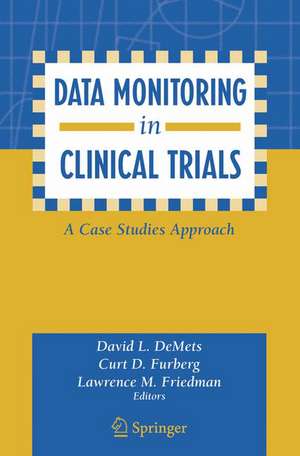Data Monitoring in Clinical Trials: A Case Studies Approach
Editat de David L. DeMets, Curt D. Furberg, Lawrence M. Friedmanen Limba Engleză Paperback – 30 sep 2005
This book should be useful to anyone serving on a data and safety monitoring board, or planning to do so, for colleagues in academia, industry and governmental agencies, and for teaching students in biostatistics, epidemiology, clinical trials and medical ethics. No other text has as extensive a collection of cases which provide insight into the many issues, often conflicting, that must be examined before recommendations to continue or discontinue a trial can be made. While depth in statistical methods is not required, some familiarity with statistical design and analysis issues in clinical trials is helpful. The cases cover trials which were terminated early for convincing evidence of benefit, or for harmful effects. Cases with complex issues are also included. This series of cases should provide broad background information for potentialmonitoring committee members and better prepare them for the challenges that may exist in the trials for which they are responsible.
"This book is a must-read for individuals serving on or supporting data monitoring committees as well as statisticians and other disciplines involved in the design and analysis of clinical trials with interim monitoring." Journal of Biopharmaceutical Sciences, Issue 6, 2006
Preț: 589.14 lei
Preț vechi: 693.12 lei
-15% Nou
Puncte Express: 884
Preț estimativ în valută:
112.74€ • 118.24$ • 93.85£
112.74€ • 118.24$ • 93.85£
Carte tipărită la comandă
Livrare economică 01-15 aprilie
Preluare comenzi: 021 569.72.76
Specificații
ISBN-13: 9780387203300
ISBN-10: 0387203303
Pagini: 374
Ilustrații: XXVI, 374 p.
Dimensiuni: 155 x 235 x 19 mm
Greutate: 0.56 kg
Ediția:2006
Editura: Springer
Colecția Springer
Locul publicării:New York, NY, United States
ISBN-10: 0387203303
Pagini: 374
Ilustrații: XXVI, 374 p.
Dimensiuni: 155 x 235 x 19 mm
Greutate: 0.56 kg
Ediția:2006
Editura: Springer
Colecția Springer
Locul publicării:New York, NY, United States
Public țintă
ResearchCuprins
Introduction/Overview.- Monitoring Committees: Why and How.- Lessons Learned.- FDA and Clinical Trial Data Monitoring Committees.- General Benefit.- to Case Studies Showing Benefit from the Intervention.- Assessing Possible Late Treatment Effects Early: The Diabetic Retinopathy Study Experience.- Data and Safety Monitoring in the Beta-Blocker Heart Attack Trial: Early Experience in Formal Monitoring Methods.- Data Monitoring for the Aspirin Component of the Physicians’ Health Study: Issues in Early Termination for a Major Secondary Endpoint.- Early Termination of the Stroke Prevention in Atrial Fibrillation I Trial: Protecting Participant Interests in the Face of Scientific Uncertainties and the Cruel Play of Chance.- Early Termination of the Diabetes Control and Complications Trial.- Data Monitoring in the AIDS Clinical Trials Group Study #981: Conflicting Interim Results.- Challenges in Monitoring the Breast Cancer Prevention Trial.- Data Monitoring Experience in the Metoprolol CR/XL Randomized Intervention Trial in Chronic Heart Failure: Potentially High-Risk Treatment in High-Risk Patients.- Stopping the Randomized Aldactone Evaluation Study Early for Efficacy.- Data Monitoring in the Heart Outcomes Prevention Evaluation and the Clopidogrel in Unstable Angina to Prevent Recurrent Ischemic Events Trials: Avoiding Important Information Loss.- The Data Monitoring Experience in the Candesartan in Heart Failure Assessment of Reduction in Mortality and Morbidity Program.- General Harm.- to Case Studies Showing Harmful Effects of the Intervention.- Breaking New Ground: Data Monitoring in the Coronary Drug Project.- The Data Monitoring Experience in the Cardiac Arrhythmia Suppression Trial: The Need to Be Prepared Early.- Data Monitoring in the Prospective RandomizedMilrinone Survival Evaluation: Dealing With an Agonizing Trend.- Stopping the Carotene and Retinol Efficacy Trial: The Viewpoint of the Safety and Endpoint Monitoring Committee.- Monitoring a Clinical Trial With Waiver of Informed Consent: Diaspirin Cross-Linked Hemoglobin for Emergency Treatment of Post—Traumatic Shock.- Consideration of Early Stopping and Other Challenges in Monitoring the Heart and Estrogen/Progestin Replacement Study.- Data Monitoring in the Antihypertensive and Lipid-Lowering Treatment to Prevent Heart Attack Trial: Early Termination of the Doxazosin Treatment Arm.- Case 19: Data Monitoring Experience in the Moxonidine Congestive Heart Failure Trial.- Data Monitoring of a Placebo-Controlled Trial of Daclizumab in Acute Graft-Versus-Host Disease.- Special Issues.- to Case Studies With Special Issues.- Clinical Trials of Herpes Simplex Encephalitis: The Role of the Data Monitoring Committee.- The Nocturnal Oxygen Therapy Trial Data Monitoring Experience: Problem With Reporting Lags.- Stopping a Trial for Futility: The Cooperative New Scandinavian Enalapril Survival Study II.- Lessons From Warfarin Trials in Atrial Fibrillation: Missing the Window of Opportunity.- Data Monitoring Experience in the AIDS Toxoplasmic Encephalitis Study.- Data Monitoring in the Randomized Evaluation of Strategies for Left Ventricular Dysfunction Pilot Study: When Reasonable People Disagree.- The Data Monitoring Experience in the Carvedilol Post-Infarct Survival Control in Left Ventricular Dysfunction Study: Hazards of Changing Primary Outcomes.- Controversies in the Early Reporting of a Clinical Trial in Early Breast Cancer.- Making Independence Work: Monitoring the Bevacizumab Colorectal Cancer Clinical Trial.
Recenzii
From the reviews:
"This book is a must-read for individuals serving on or supporting data monitoring committees as well as statisticians and other disciplines involved in the design and analysis of clinical trials with interim monitoring." Journal of Biopharmaceutical Sciences, Issue 6, 2006
"This edited book gives a brief introduction to data-monitoring committees for clinical trials … . It has been my experience that many persons asked to serve on data-monitoring committees have scientific or clinical expertise relevant to the trial, but have little or no understanding of the purpose of the data-monitoring committee … . Such individuals would greatly benefit from reading this book prior to serving on a data-monitoring committee, as would anyone wishing to gain some insight into the responsibilities and challenges facing data-monitoring committees." (S. W. Lagakos, Short Book Reviews, Vol. 26 (1), 2006)
"The chapters are clearly written, and the take-home lessons are apparent. The 70 contributing authors represent a full range of perspectives on data monitoring and give balanace to the exposition. ...In summary, the book achieves its goal and deserves a place in every medical school's library." (J. Wade Davis, Journal of the American Statistical Association, Vol. 102, No. 477, 2007)
"This book is highly recommended for anyone who starts to serve on a DMC or is already a member of such a board, and also for people in academia, industry, and regulatory agencies as well as for students in biostatistics, epidemiology, clinical trails, and medical ethics." Iris Pigeot, Biometrics, December 2006)
"This book illustrates the complexity of data monitoring processes through a series of case studies presented by many distinguished clinical trial experts. … A total of 29 case studies have been discussed. … This book would be quite useful for the researchers, investigators and individuals serving on the DMC, orplanning to do so, who would like to understand the application of data monitoring principles in clinical trials. I have thoroughly enjoyed reading this book and I think it has served its purpose … ." (Faisel Yunus, Journal of Applied Statistics, Vol. 35 (5), 2007)
"This book is a must-read for individuals serving on or supporting data monitoring committees as well as statisticians and other disciplines involved in the design and analysis of clinical trials with interim monitoring." Journal of Biopharmaceutical Sciences, Issue 6, 2006
"This edited book gives a brief introduction to data-monitoring committees for clinical trials … . It has been my experience that many persons asked to serve on data-monitoring committees have scientific or clinical expertise relevant to the trial, but have little or no understanding of the purpose of the data-monitoring committee … . Such individuals would greatly benefit from reading this book prior to serving on a data-monitoring committee, as would anyone wishing to gain some insight into the responsibilities and challenges facing data-monitoring committees." (S. W. Lagakos, Short Book Reviews, Vol. 26 (1), 2006)
"The chapters are clearly written, and the take-home lessons are apparent. The 70 contributing authors represent a full range of perspectives on data monitoring and give balanace to the exposition. ...In summary, the book achieves its goal and deserves a place in every medical school's library." (J. Wade Davis, Journal of the American Statistical Association, Vol. 102, No. 477, 2007)
"This book is highly recommended for anyone who starts to serve on a DMC or is already a member of such a board, and also for people in academia, industry, and regulatory agencies as well as for students in biostatistics, epidemiology, clinical trails, and medical ethics." Iris Pigeot, Biometrics, December 2006)
"This book illustrates the complexity of data monitoring processes through a series of case studies presented by many distinguished clinical trial experts. … A total of 29 case studies have been discussed. … This book would be quite useful for the researchers, investigators and individuals serving on the DMC, orplanning to do so, who would like to understand the application of data monitoring principles in clinical trials. I have thoroughly enjoyed reading this book and I think it has served its purpose … ." (Faisel Yunus, Journal of Applied Statistics, Vol. 35 (5), 2007)
Textul de pe ultima copertă
Randomized clinical trials are the gold standard for establishing many clinical practice guidelines and are central to evidence based medicine. Obtaining the best evidence through clinical trials must be done within the boundaries of rigorous science and ethical principles. One fundamental principle is that trials should not continue longer than necessary to reach their objectives. Therefore, trials must be monitored for recruitment progress, quality of data, adherence to patient care or prevention standards, and early evidence of benefit or harm. Frequently, a group of external experts, independent from the investigators and trial sponsor, is charged with this monitoring responsibility, especially for safety and early benefit. This group is referred to by various names, such as a data monitoring committee or a data and safety monitoring board. This book, through a series of case studies presented by many distinguished clinical trial experts, illustrates the complexity of this monitoring process. The editors provide an overview of the process and a summary of a multitude of the lessons learned from the cases presented.
This book should be useful to anyone serving on a data and safety monitoring board, or planning to do so, for colleagues in academia, industry and governmental agencies, and for teaching students in biostatistics, epidemiology, clinical trials and medical ethics. No other text has as extensive a collection of cases which provide insight into the many issues, often conflicting, that must be examined before recommendations to continue or discontinue a trial can be made. While depth in statistical methods is not required, some familiarity with statistical design and analysis issues in clinical trials is helpful. The cases cover trials which were terminated early for convincing evidence of benefit, or for harmful effects. Cases with complex issues are also included. This series of cases should provide broad background information for potential monitoring committee members and better prepare them for the challenges that may exist in the trials for which they are responsible.
The three editors have contributed two overview chapters as well as several case studies to go along with cases contributed by a distinguished group of colleagues experienced in the design, monitoring and analysis of clinical trials. Dr. David DeMets is currently Professor and Chair, Department of Biostatistics and Medical Informatics at the University of Wisconsin-Madison. He is past president of the Eastern North American Region (ENAR) of the International Biometric Society, a past member of the Board of Directors of the American Statistical Association and an elected Fellow. He recently received the Robert Gordon Lectureship Award, given by the National Institutes of Health, for significant contributions to the field of clinical trials. Dr. Curt Furberg, is currently Professor (and former Chair) of the Department of Public Health Sciences at Wake Forest University. Previously, he was Head of the Clinical Trials Branch and Associate Director of the Clinical Applications and Prevention Program at the National Heart, Lung, and Blood Institute. Dr. Lawrence Friedman is a former Director of the Division of Epidemiology and Clinical Applications and a former Assistant Director for Ethics and Clinical Research at the National Heart, Lung, and Blood Institute. All three are past presidents of the Society of Clinical Trials. The editors have collaborated previously as coauthors of a text: the Fundamentals of Clinical Trials.
This book should be useful to anyone serving on a data and safety monitoring board, or planning to do so, for colleagues in academia, industry and governmental agencies, and for teaching students in biostatistics, epidemiology, clinical trials and medical ethics. No other text has as extensive a collection of cases which provide insight into the many issues, often conflicting, that must be examined before recommendations to continue or discontinue a trial can be made. While depth in statistical methods is not required, some familiarity with statistical design and analysis issues in clinical trials is helpful. The cases cover trials which were terminated early for convincing evidence of benefit, or for harmful effects. Cases with complex issues are also included. This series of cases should provide broad background information for potential monitoring committee members and better prepare them for the challenges that may exist in the trials for which they are responsible.
The three editors have contributed two overview chapters as well as several case studies to go along with cases contributed by a distinguished group of colleagues experienced in the design, monitoring and analysis of clinical trials. Dr. David DeMets is currently Professor and Chair, Department of Biostatistics and Medical Informatics at the University of Wisconsin-Madison. He is past president of the Eastern North American Region (ENAR) of the International Biometric Society, a past member of the Board of Directors of the American Statistical Association and an elected Fellow. He recently received the Robert Gordon Lectureship Award, given by the National Institutes of Health, for significant contributions to the field of clinical trials. Dr. Curt Furberg, is currently Professor (and former Chair) of the Department of Public Health Sciences at Wake Forest University. Previously, he was Head of the Clinical Trials Branch and Associate Director of the Clinical Applications and Prevention Program at the National Heart, Lung, and Blood Institute. Dr. Lawrence Friedman is a former Director of the Division of Epidemiology and Clinical Applications and a former Assistant Director for Ethics and Clinical Research at the National Heart, Lung, and Blood Institute. All three are past presidents of the Society of Clinical Trials. The editors have collaborated previously as coauthors of a text: the Fundamentals of Clinical Trials.
Caracteristici
From the authors of "Fundamentals of Clinical Trials" which has sold over 15,000 copies world wide since its publication in 1998
















